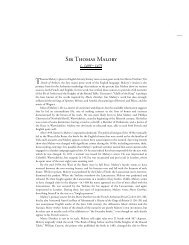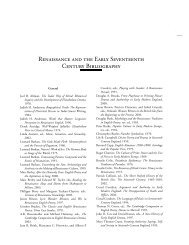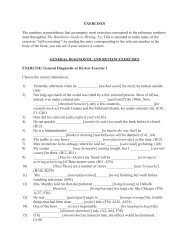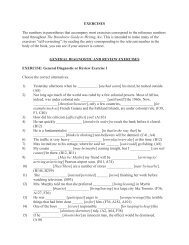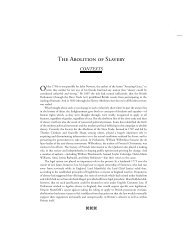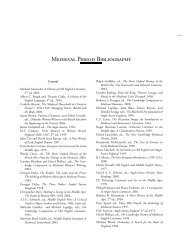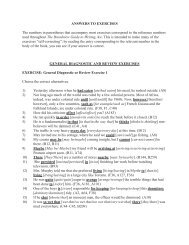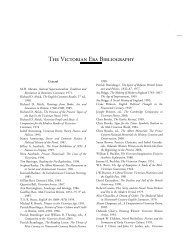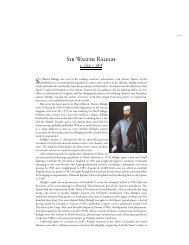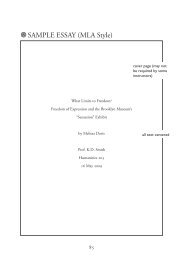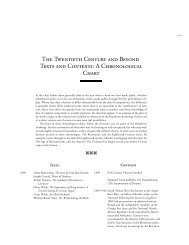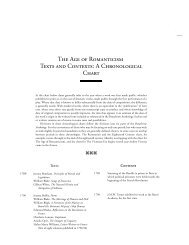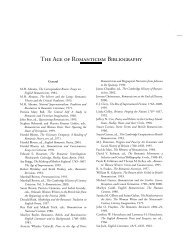Thomas Lodge - Broadview Press Publisher's Blog
Thomas Lodge - Broadview Press Publisher's Blog
Thomas Lodge - Broadview Press Publisher's Blog
You also want an ePaper? Increase the reach of your titles
YUMPU automatically turns print PDFs into web optimized ePapers that Google loves.
25<br />
30<br />
35<br />
40<br />
45<br />
whatsoever, it prepareth the mind and preventeth<br />
mishaps. And lest I among the poor tirones of<br />
learning, 1 who desire the increase thereof with the<br />
most though deserve therein with the least, should<br />
seem to forget this especially and ingrafted virtue<br />
so admirably bestowed upon Your Worship, I have<br />
thought good to present you with a rude and<br />
homely 2 written history, which if with like regard<br />
you shall accept as Alphonsus did the silly satires<br />
of Philelphus, 3 I doubt not but in short time to<br />
publish that under your name which shall not only<br />
merit and deserve your acceptance, but also<br />
mightily profit all such as are studious in all sorts<br />
of learning. Till when, I most humbly commend<br />
me, desiring Your Worship most earnestly to prosecute<br />
your virtuous enterprises, beseeching God<br />
to prosper you in them and all other, to the<br />
advancement of letters.<br />
From my chamber. 2. May. 1591.<br />
Your Worship’s to command,<br />
T.L.G.<br />
To the Courteous Reader Whatsoever.<br />
Gentlemen, I have upon the earnest request of<br />
some my good friends drawn out of the old and<br />
ancient antiquaries 4 the true life of Robert, second<br />
1 tirones of learning Latin, tiro, -onis, m.: literally, newly levied soldiers,<br />
recruits; thus, beginners, newly-initiated men.<br />
2 rude unpolished, deficient in literary merit; homely simply, unpretentiously;<br />
without adornment or polish.<br />
3 Philelphus Francesco Filelfo (1398-1481), Italian humanist, professor<br />
and writer, composed in a number of genres, including satire<br />
(published, Venice, 1502); there also seems to be another Filelfo, a<br />
Renaissance writer and “pagan,” who was rewarded by Nicholas V<br />
for his satires (these may, indeed, be the same person). See his<br />
Satyrarum hecatostichon septimus decas, hecatosticha quinta (satires published,<br />
Milan, 1476 by Christoph Valdarfer).<br />
4 antiquaries An antiquary is an official custodian or recorder of<br />
antiquities; here, <strong>Lodge</strong> uses the word to refer to the written records<br />
such official historians produce. However, the source of Robert is not<br />
an historical chronicle, and neither Robert, Aubert, nor Editha have<br />
convincing historical counterparts. Instead, the romance resembles<br />
the legend of Sir Gowther, versions of which exist in a number of<br />
European literatures. N.B. Paradise speculates that Robert’s character<br />
and the tale’s setting in Normandy exploited “the fear [...] inspired by<br />
T HOMAS L ODGE<br />
50<br />
55<br />
60<br />
65<br />
70<br />
75<br />
7<br />
duke of Normandy (surnamed for his youthful<br />
imperfections, Robin the Devil), wherein I stand<br />
not so much on the terms as the truth, publishing<br />
as much as I have read and not so much as they<br />
have written. The lodestars 5 that directed me in<br />
my course, if they have colours and no counterfeit,<br />
do me right to say they set down colours<br />
without counterfeit; yet many things have happened<br />
in times past incredible in our age, and in<br />
our age such things have fallen out as had our<br />
fathers known they had marvelled. It only<br />
behooveth 6 us to apply all things that tend to good<br />
to their end, which is virtue, and esteem them; to<br />
intend all things that are bad to their end, which is<br />
vice, and eschew them. So shall we in reading reap<br />
that fruit, that impossible things shall be referred<br />
to God and possible ordered to our amends.<br />
Farewell.<br />
T.L.G.<br />
The Famous, True, and Historical Life of<br />
Robert, Second Duke of Normandy.<br />
[Chapter 1]<br />
In the populous and plentiful dukedom of Normandy<br />
(in times past called Neustria), at such time<br />
as Pepin, the father of the great King Charlemagne,<br />
governed the flourishing kingdom of<br />
France, 7 Aubert, the first duke of that country, by<br />
some supposed to be Ron of Denmark, began to<br />
signorize 8 in the same about the year of our Lord<br />
750; a prince by nature affable, in nurture fortunate,<br />
as glorious for his conquests as gracious in<br />
the medieval Norman warriors and by Robert Guiscard in particular”<br />
(p. 93). <strong>Lodge</strong> may have used Wynkyn de Worde’s 1510 English<br />
version of this tale (<strong>Thomas</strong> <strong>Lodge</strong>: The History of an Elizabethan [Yale<br />
UP, 1970], pp. 93-95).<br />
5 lodestars stars that direct travellers, such as the pole star; thus, ‘the<br />
guiding stars’ or principles of one’s life and actions.<br />
6 behooveth profits, benefits.<br />
7 Pepin …France Pepin III, also known as Pepin the Short (c. 714-<br />
68), first Carolingian king of the Franks (751-68).<br />
8 signorize rule, reign.



